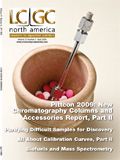Short Courses
Short Courses
GC
Chromatography of Protein Therapeutic Drugs
15 April 2009
Ft. Washington, PA.
Contact: Jim Sullivan, Jindai Bio, tel. (302)737-2137,
Email: Jjfsullivan@comcast.netWebsite: www.cfdv.org
Gas Chromatography: Fundamentals, Troubleshooting, and Method Development
20–24 April 2009
Chicago, IL.
Contact: Website: http://www.acs.org
Modern Practice of Gas Chromatography
18–20 May 2009
West Chester, PA.
Contact: Thomas A. Brettell, Cedar Crest College, tel. (610)606-4666 ext.3495,
Email: tabrette@cedarcrest.eduWebsite: www.cfdv.org
Gas Chromatography: Fundamentals, Troubleshooting, and Method Development
20–24 July 2009
Chicago, IL.
Contact: Website: http://www.acs.org
Gas Chromatography: Fundamentals, Troubleshooting, and Method Development
9–13 November 2009
Chicago, IL.
Contact: Website: http://www.acs.org
HPLC
Normal & Reversed Phase HPLC
20–21 April 2009
Boulder, CO.
Contact: Ronald Sutton, Chromatography Institute; tel: 1-800-788-9922,
Website: www.HPLCinstitute.com
HPLC Maintenance & Troubleshooting
22 April 2009
Boulder, CO.
Contact: Ronald Sutton, Chromatography Institute; tel: 1-800-788-9922,
Website: www.HPLCinstitute.com
HPLC Analysis and Purifications of Proteins & Peptides
23–24 April 2009
Boulder, CO.
Contact: Ronald Sutton, Chromatography Institute; tel: 1-800-788-9922,
Website: www.HPLCinstitute.com
HPLC Certification Examination
22 and 24 April 2009
Boulder, CO.
Contact: Ronald Sutton, Chromatography Institute; tel: 1-800-788-9922,
Website: www.HPLCinstitute.com
Introductory HPLC
11–13 May 2009
West Chester, PA.
Contact: William Champion, SLED & Co., tel. (302)475-2466,
Email: wlchampion@gmail.comWebsite: www.cfdv.org
Fundamentals of High Performance Liquid Chromatography
17–18 May 2009
Boston, MA.
Contact: Website: http://www.acs.org
Normal & Reversed Phase HPLC
18–19 May 2009
Baltimore, MD.
Contact: Ronald Sutton, Chromatography Institute; tel: 1-800-788-9922,
Website: www.HPLCinstitute.com
HPLC Maintenance & Troubleshooting
20 May 2009
Baltimore, MD.
Contact: Ronald Sutton, Chromatography Institute; tel: 1-800-788-9922,
Website: www.HPLCinstitute.com
HPLC Analysis and Purifications of Proteins & Peptides
21–22 May 2009
Baltimore, MD.
Contact: Ronald Sutton, Chromatography Institute; tel: 1-800-788-9922,
Website: www.HPLCinstitute.com
HPLC Certification Examination
20 and 22 May 2009
Baltimore, MD.
Contact: Ronald Sutton, Chromatography Institute; tel: 1-800-788-9922,
Website: www.HPLCinstitute.com
Advanced LC and Lab with Hands-on LC–MS
8–10 June 2009
Collegeville, PA.
Contact: Brian Bidlingmeyer, Agilent Technologies, tel. (302)993-5835,
Email: brian_bidlingmeyer@agilent.comWebsite: www.cfdv.org
Normal & Reversed Phase HPLC
15–16 June 2009
Chicago, IL.
Contact: Ronald Sutton, Chromatography Institute; tel: 1-800-788-9922, Website: www.HPLCinstitute.com
HPLC Maintenance & Troubleshooting
17 June 2009
Chicago, IL.
Contact: Ronald Sutton, Chromatography Institute; tel: 1-800-788-9922,Website: www.HPLCinstitute.com
HPLC Analysis and Purifications of Proteins & Peptides
18–19 June 2009
Chicago, IL.
Contact: Ronald Sutton, Chromatography Institute; tel: 1-800-788-9922, Website: www.HPLCinstitute.com
HPLC Certification Examination
17 and 19 June 2009
Chicago, IL.
Contact: Ronald Sutton, Chromatography Institute; tel: 1-800-788-9922,Website: www.HPLCinstitute.com
High Performance Liquid Chromatography: Fundamentals, Troubleshooting, and Method Development
13–17 July 2009
Chicago, IL.
Contact: Website: http://www.acs.org
High Performance Liquid Chromatography: Fundamentals, Troubleshooting, and Method Development
5–9 October 2009
Chicago, IL.
Contact: Website: http://www.acs.org
Miscellaneous
Analysis and Interpretation of Mass Spectral Data Development
6–7 May 2009
Durham, NC.
Contact: Website: http://www.acs.org
Introduction to Modern Mass Spectrometry
18–19 May 2009
Boston, MA.
Contact: Website: http://www.acs.org

Fundamentals of Benchtop GC–MS Data Analysis and Terminology
April 5th 2025In this installment, we will review the fundamental terminology and data analysis principles in benchtop GC–MS. We will compare the three modes of analysis—full scan, extracted ion chromatograms, and selected ion monitoring—and see how each is used for quantitative and quantitative analysis.
Characterizing Plant Polysaccharides Using Size-Exclusion Chromatography
April 4th 2025With green chemistry becoming more standardized, Leena Pitkänen of Aalto University analyzed how useful size-exclusion chromatography (SEC) and asymmetric flow field-flow fractionation (AF4) could be in characterizing plant polysaccharides.
This information is supplementary to the article “Accelerating Monoclonal Antibody Quality Control: The Role of LC–MS in Upstream Bioprocessing”, which was published in the May 2025 issue of Current Trends in Mass Spectrometry.









